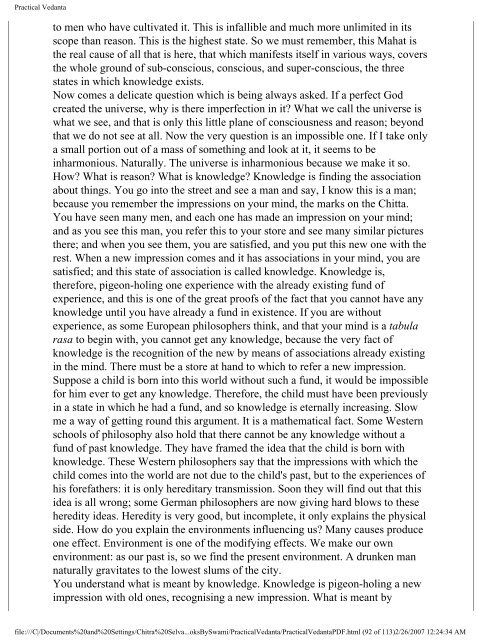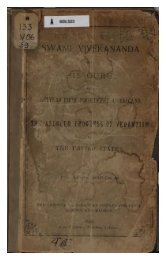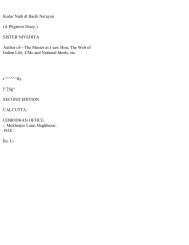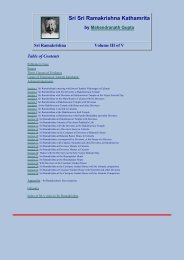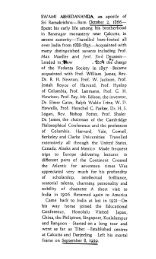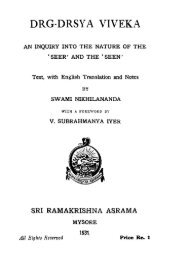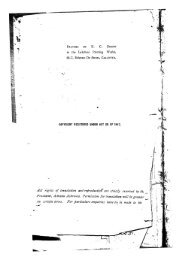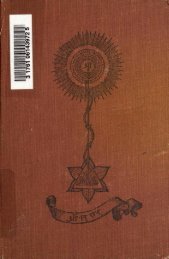<strong>Practical</strong> <strong>Vedanta</strong>to men who have cultivated it. This is infallible and much more unlimited in itsscope than reason. This is the highest state. So we must remember, this Mahat isthe real cause of all that is here, that which manifests itself in various ways, coversthe whole ground of sub-conscious, conscious, and super-conscious, the threestates in which knowledge exists.Now comes a delicate question which is being always asked. If a perfect Godcreated the universe, why is there imperfection in it? What we call the universe iswhat we see, and that is only this little plane of consciousness and reason; beyondthat we do not see at all. Now the very question is an impossible one. If I take onlya small portion out of a mass of something and look at it, it seems to beinharmonious. Naturally. The universe is inharmonious because we make it so.How? What is reason? What is knowledge? Knowledge is finding the associationabout things. You go into the street and see a man and say, I know this is a man;because you remember the impressions on your mind, the marks on the Chitta.You have seen many men, and each one has made an impression on your mind;and as you see this man, you refer this to your store and see many similar picturesthere; and when you see them, you are satisfied, and you put this new one with therest. When a new impression comes and it has associations in your mind, you aresatisfied; and this state of association is called knowledge. Knowledge is,therefore, pigeon-holing one experience with the already existing fund ofexperience, and this is one of the great proofs of the fact that you cannot have anyknowledge until you have already a fund in existence. If you are withoutexperience, as some European philosophers think, and that your mind is a tabularasa to begin with, you cannot get any knowledge, because the very fact ofknowledge is the recognition of the new by means of associations already existingin the mind. There must be a store at hand to which to refer a new impression.Suppose a child is born into this world without such a fund, it would be impossiblefor him ever to get any knowledge. Therefore, the child must have been previouslyin a state in which he had a fund, and so knowledge is eternally increasing. Slowme a way of getting round this argument. It is a mathematical fact. Some Westernschools of philosophy also hold that there cannot be any knowledge without afund of past knowledge. They have framed the idea that the child is born withknowledge. These Western philosophers say that the impressions with which thechild comes into the world are not due to the child's past, but to the experiences ofhis forefathers: it is only hereditary transmission. Soon they will find out that thisidea is all wrong; some German philosophers are now giving hard blows to theseheredity ideas. Heredity is very good, but incomplete, it only explains the physicalside. How do you explain the environments influencing us? Many causes produceone effect. Environment is one of the modifying effects. We make our ownenvironment: as our past is, so we find the present environment. A drunken mannaturally gravitates to the lowest slums of the city.You understand what is meant by knowledge. Knowledge is pigeon-holing a newimpression with old ones, recognising a new impression. What is meant byfile:///C|/Documents%20and%20Settings/Chitra%20Selva...oksBySwami/<strong>Practical</strong><strong>Vedanta</strong>/<strong>Practical</strong><strong>Vedanta</strong>PDF.html (92 of 113)2/26/2007 12:24:34 AM
<strong>Practical</strong> <strong>Vedanta</strong>recognition? Finding associations with similar impressions that one already has.Nothing further is meant by knowledge. If that is the case, if knowledge meansfinding the associations, then it must be that to know anything we have to set thewhole series of its similars. Is it not so? Suppose you take a pebble; to find theassociation, you have to see the whole series of pebbles similes to it. But with ourperception of the universe as a whole we cannot do that, because in the pigeonholeof our mind there is only one single record of the perception, we have noother perception of the same nature or class, we cannot compare it with any other.We cannot refer it to its associations. This bit of the universe, cut off by ourconsciousness, is a startling new thing, because we have not been able to find itsassociations. Therefore, we are struggling with it, and thinking it horrible, wicked,and bad; we may sometimes think it is good, but we always think it is imperfect. Itis only when we find its associations that the universe can be known. We shallrecognise it when we go beyond the universe and consciousness, and then theuniverse will stand explained. Until we can do that, all the knocking of our headsagainst a wall will never explain the universe, because knowledge is the finding ofsimilars, and this conscious plane only gives us one single perception of it. Sowith our idea of God. All that we see of God is only a part just as we see only oneportion of the universe, and all the rest is beyond human cognition. "I, theuniversal; so great am I that even this universe is but a part of Me." That is whywe see God as imperfect, and do not understand Him. The only way to understandHim and the universe is to go beyond reason, beyond consciousness. "When thougoest beyond the heard and the hearing, the thought and the thinking, then alonewilt thou come to Truth." "Go thou beyond the scriptures, because they teach onlyup to nature, up to the three qualities." When we go beyond them, we find theharmony, and not before.The microcosm and the macrocosm are built on exactly the same plan, and in themicrocosm we know only one part, the middle part. We know neither the subconscious,nor the super-conscious. We know the conscious only. If a man standsup and says, "I am a sinner", he makes an untrue statement because he does notknow himself. He is the most ignorant of men; of himself he knows only one part,because his knowledge covers only a part of the ground he is on. So with thisuniverse, it is possible to know only a part of it with the reason, not the whole ofit; for the sub-conscious, the conscious and the super-conscious, the individualMahat and the universal Mahat, and all the subsequent modifications, constitutethe universe.What makes nature (Prakriti) change? We see so far that everything, all Prakriti, isJada, insentient. It is all compound and insentient. Wherever there is law, it isproof that the region of its play is insentient. Mind, intelligence, will, andeverything else is insentient. But they are all reflecting the sentiency, the "Chit" ofsome being who is beyond all this, whom the Sankhya philosophers call"Purusha". The Purusha is the unwitting cause of all the changes in the universe.That is to say, this Purusha, taking Him in the universal sense, is the God of thefile:///C|/Documents%20and%20Settings/Chitra%20Selva...oksBySwami/<strong>Practical</strong><strong>Vedanta</strong>/<strong>Practical</strong><strong>Vedanta</strong>PDF.html (93 of 113)2/26/2007 12:24:34 AM
- Page 1 and 2:
Practical VedantaPractical VedantaP
- Page 3 and 4:
Practical Vedantaworld. If I am a s
- Page 5 and 6:
Practical Vedantadifference is only
- Page 7 and 8:
Practical VedantaThe ideal of faith
- Page 9 and 10:
Practical Vedantamoment of our live
- Page 11 and 12:
Practical Vedantaof the Christs and
- Page 13 and 14:
Practical Vedanta"This life is Brah
- Page 15 and 16:
Practical Vedantadark fifteen days,
- Page 17 and 18:
Practical Vedantalife. This is the
- Page 19 and 20:
Practical Vedantaeverything would b
- Page 21 and 22:
Practical Vedantait is only through
- Page 23 and 24:
Practical Vedantawhich is that subt
- Page 25 and 26:
Practical Vedantanoumenon and pheno
- Page 27 and 28:
Practical Vedantato which is the be
- Page 29 and 30:
Practical VedantaAbsolute.The finit
- Page 31 and 32:
Practical Vedantawhich is not the q
- Page 33 and 34:
Practical Vedantaexperience that th
- Page 35 and 36:
Practical Vedantafulfilled. The Jiv
- Page 37 and 38:
Practical Vedantabetween the pure r
- Page 39 and 40:
Practical Vedantacome out straight.
- Page 41 and 42: Practical Vedantawar with one anoth
- Page 43 and 44: Practical Vedantanobody could under
- Page 45 and 46: Practical VedantaMy idea, therefore
- Page 47 and 48: Practical Vedantathe same methods.
- Page 49 and 50: Practical Vedantavarious minds, all
- Page 51 and 52: Practical Vedantabrotherhood; but t
- Page 53 and 54: Practical Vedantabrotherhood, but w
- Page 55 and 56: Practical Vedantawe all go with ves
- Page 57 and 58: Practical Vedantareason. What can y
- Page 59 and 60: Practical Vedantabeen preached in t
- Page 61 and 62: Practical Vedantathe husband kisses
- Page 63 and 64: Practical Vedantaof the knowledge a
- Page 65 and 66: Practical Vedantafor those who only
- Page 67 and 68: Practical Vedantasun exists because
- Page 69 and 70: Practical Vedantaof death was pleas
- Page 71 and 72: Practical VedantaGod. We must learn
- Page 73 and 74: Practical Vedantaa plague comes, it
- Page 75 and 76: Practical VedantaAtman? "As with a
- Page 77 and 78: Practical Vedantathat immortal One,
- Page 79 and 80: Practical Vedantaand the third egoi
- Page 81 and 82: Practical VedantaWitness of the uni
- Page 83 and 84: Practical VedantaPractical Vedanta1
- Page 85 and 86: Practical Vedantaeternal ; every ot
- Page 87 and 88: Practical Vedantafaculty, Buddhi, w
- Page 89 and 90: Practical VedantaPractical Vedanta1
- Page 91: Practical Vedantastepping-stone to
- Page 95 and 96: Practical Vedantasentient." This is
- Page 97 and 98: Practical Vedantaessentially differ
- Page 99 and 100: Practical Vedantaexistence is limit
- Page 101 and 102: Practical Vedantalive, for I am lif
- Page 103 and 104: Practical Vedantasee from Kapila's
- Page 105 and 106: Practical Vedantalimitation, but th
- Page 107 and 108: Practical Vedantaperfect, infinite,
- Page 109 and 110: Practical Vedantaindividuality, of
- Page 111 and 112: Practical Vedantarepeat [something]
- Page 113: Practical Vedantaperson who dies in


